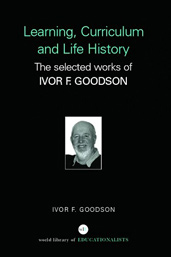Learning, Curriculum and Life Politics: the selected works of Ivor F. Goodson
Long Waves of Educational Reform
These teachers wanted to make a difference in young people’s lives, and saw a public system as a ‘huge leveler’ and ‘liberator’ from social and economic disadvantage. One teacher spoke of the feelings at this time:
One of the greatest purposes of schooling is to build community and some common experiences. So it’s a cultural experience…. Community in the sense of the sort of cultural community that we speak the same language on a variety of levels. And I don’t mean the English language. I mean we understand that the history, the traditions, the culture, the norms. The values of this society are learned through the education system. So it’s that collective experience.
Alongside the young and innovative new staff, the leadership of the school worked to nurture and develop professional expertise. Rowan was the Principal for the period of hope and optimism and, when he left in 1974, so close were his bonds with the staff, that some of those most devoted and loyal went with him to open a new school. When he left, the management of the school changed direction. Rowan embodied the idealism, collegiality and empowerment of cohort one teachers just beginning their careers. Arness took them in the opposite direction of formality, top-down control, and paternalism – representing a gradual decline in faculty mission and morale and optimism.
This disjuncture between the two leadership periods makes a very clear dividing line at the end of the conjunctural period. The unparalleled burst of creativity was now at an end and a new era, which was to culminate in standardization and a wave of early retirements, was beginning.
In the United States, the 1960s were a decade of social ferment and of questioning and challenging established traditions and procedures. This was the time when President Lyndon Johnson announced he was building the ‘Great Society’, a society inclusive of race and of all social classes, a society that would tackle inequality and pursue social justice. Tyack & Tobin provide a valuable summary of these times:
In the 1960s, years of innovation when rebels were questioning the conventional wisdom in education, reformers proposed another rethinking of time, subjects, space, and class size. They believed that because humans had created institutional forms, they could and should change them when they no longer served humane goals. Typically, they regarded the old grammar of schooling as rigid, hierarchical, and based on a negative view of human nature. Students, the old system implicitly announced, were young workers who needed to be compelled to learn by their supervisors – teachers – in classes standardized in size, time, space, and subjects. Instead, the young should be seen as active, intellectually curious, and capable of taking charge of their own learning. If one started from that premise, the existing grammar of schooling was hardly ‘functional’ [Goodman 1964; Silberman 1970].
Reinventing the Rousseauian notion that people are born free but are everywhere in chains, some radical reformers rejected the institutional form of the public school outright, advocating ‘free schools’ and ‘schools without walls’ to take the place of conventional classrooms, preset curricula, and traditional teacher roles (Tyack & Tobin 1994, p. 471).
In the decade of the 60’s, a wide range of more liberal organizations and groups sought to replace the isolated classroom with the pattern of teacher recitation and student passivity. Students were to become active learners in partnership with facilitating teachers who often formed into teams. These teams operated in open plan buildings following J. Lloyd Trump’s ideas in his ‘images of the future’ blueprint (Lloyd Trump 1959).
